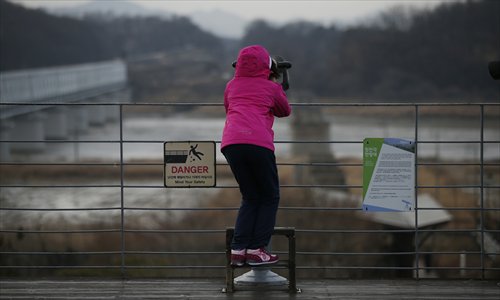China needs support to influence N.Korea
Pressure could risk escalating tensions

A girl on Sunday uses binoculars to watch the North side near the border village of Panmunjom, which has separated the two Koreas since the Korean War, in Paju, South Korea. North Korea has formed a new military unit to deploy an intercontinental ballistic missile, Yonhap News Agency reported Sunday. Photo: AP
The US and its allies should cooperate with China rather than add pressure which could risk raising tensions on the Korean Peninsula, experts said Sunday, as the global fallout from recent missile and nuclear tests continues to rumble.
China and North Korea are two independent sovereign states, so China's efforts in persuading its neighbor to give up nuclear weapons should not be seen as an attempt to maintain any control over North Korea even as the country has posed a threat to border security in China, Lü Chao, a research fellow at the Liaoning Academy of Social Sciences told the Global Times.
"Instead of deepening rifts over the North Korean nuclear issue by pressuring China to endorse their military deployment and sanctions, the US and South Korea should align themselves with China to persuade North Korea into negotiations," Lü said.
Senior Chinese lawmaker Fu Ying told an international security conference Saturday that China is in no way attempting to control its neighbor.
"China never believes it should control any country, nor wishes to be controlled by others," Fu, chairwoman of the Foreign Affairs Committee of the National People's Congress of China, said at the Munich Security Conference in Munich, Germany, in response to a question as to whether China has lost full control over North Korea.
"That's a typical Western question," she was quoted by the Xinhua News Agency as saying.
"China will fulfill its obligations, but it cannot take over the US' obligations. The US should not always try to outsource its problems to China," said Fu. "The key to solving concerns over North Korea security lies in the Americans' hands."
New missile unit
North Korea has formed a new military unit to deploy an intercontinental ballistic missile, South Korea's Yonhap News Agency reported Sunday.
The KN-08 Brigade, designated after the road-mobile intercontinental ballistic missile, will become a subordinate unit of the Strategic Forces, which supervises all missile units in North Korea, the report said.
The KN-08 missile would have an estimated range of over 5,500 kilometers, which "would likely be capable of reaching much of the continental US," the Pentagon was quoted by Bloomberg as saying on Saturday.
Fu said at the security forum that the US was demanding cooperation with China while considering deployment of the Terminal High Altitude Area Defense missile system in South Korea, which makes Chinese people confused and angry.
South Korea and the US are expected to begin talks next week on the possible deployment of the system. The US deployed an additional Patriot missile defense unit in South Korea in response to recent North Korean provocations, Reuters reported on Saturday.
South Korean President Park Geun-hye was "very disappointed" at China's sanction measures that were not proactive enough, Seoul-based Chosun Ilbo newspaper quoted close sources as saying on Friday.
However, more US military facilities in South Korea have had no effect on curbing North Korea's nuclear program, Lü said.
"The US and its ally South Korea should collaborate with China to bring North Korea back on track by pledging not to threaten its national security," Zhou Yongsheng, a professor at China Foreign Affairs University told the Global Times.
US pressure on South Korea to deploy missile defense systems is also aimed at Russia and China, Zhou added.
Weakened ties
Since the 1970s, ties between the two socialist neighbors have weakened.
China has prioritized national interests while attaching less importance to the coincidence of ideology, citing the different systems of leadership as an example, said Zhou, as unlike North Korea, China features central collective leadership.
North Korea firmly insists on a planned rather than a market economy and has drifted away since China took on reform and opening-up, Lü noted.
North Korea previously had taken advantage of disputes between China and the former Soviet Union, which both strived to draw North Korea over to their side by providing more economic aid than the other, said Zhang Liangui, a professor of Korean Peninsula issues at the Party School of the Communist Party of China Central Committee.
After the collapse of the Soviet Union, it became unnecessary for China to forge such a close relationship with North Korea, Zhang said.